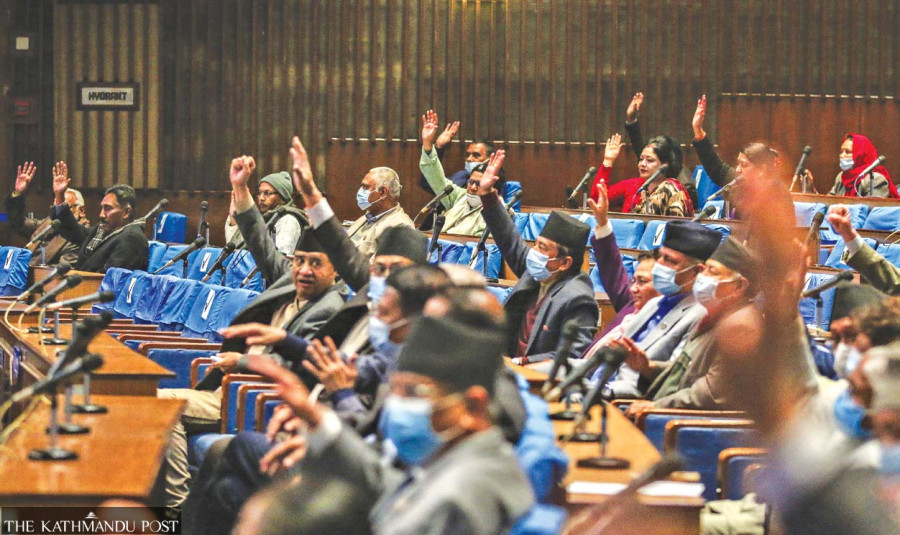National
House is prorogued; questions arise over motion to impeach chief justice
Impeachment proposal against Cholendra Shumsher Rana, registered on February 13, is in Parliament. With no session now, it is in a state of limbo.
Anil Giri & Tika R Pradhan
The meeting of the House of Representatives scheduled for Wednesday was supposed to hold deliberations on the impeachment motion against Chief Justice Cholendra Shumsher Rana. Officials at the Parliament Secretariat had said that the motion would be forwarded to the 11-member Impeachment Recommendation Committee formed on March 6 to study the allegations against Rana.
In the motion, the ruling party lawmakers have made 21 allegations against Rana in an attempt to justify why he should be impeached.
However, hours before the House was set to start deliberations on the motion, the Sher Bahadur Deuba government on Tuesday decided to prorogue the ongoing session of Parliament.
With the 10th session of the House coming to an end from Tuesday midnight, uncertainty looms as to when a decision on the impeachment motion, which was registered a month ago, will be taken.
Rana remains suspended since February 13, the day the motion was registered in Parliament.
Experts on constitutional affairs say the decision to prorogue the House is an irresponsible move by the government. They claim that prorogation could have been stopped until the motion was forwarded to the impeachment recommendation committee.
“This is injustice to Rana. Parliament should have concluded the impeachment motion against him by this session. But it has been deferred intentionally,” said Bipin Adhikari, a professor and former dean of the Kathmandu University School of Law. “At least the government could have waited until it was sent to the impeachment recommendation committee. This is an irresponsible act.”
The impeachment recommendation committee gets three months to study the allegations against Rana which can be increased by 15 more days if needed.
If the House was prorogued after sending it to the recommendation committee, it could have at least got a chance to study the allegations, experts say.
As the House is now prorogued, the next session will first hold deliberations before sending it to the recommendation panel. This means the decision on the motion has been delayed at least by over a month.
“Since the impeachment motion has already been tabled in the House and an 11-member recommendation panel has also been formed, a course has started. It will continue in the next session,” said Law Minister Dilendra Badu.
The impeachment motion against Rana was tabled in the lower house on Sunday.
As the budget session needs to begin at least a month prior to bringing the budget on May 29, as stipulated by the constitution, the 11th session could start, most probably, by April 29. Therefore the motion will be delayed by at least one and a half months.
“Discussions on the impeachment motion will continue in the budget session of Parliament,” said Dev Gurung, chief whip of the CPN (Maoist Centre), who is also one of the three proposers of the impeachment motion against Rana. “The House was prorogued as there was not much time to begin the budget session.”
But CPN-UML leaders have said that what they have been saying on impeachment motion turned true as the House was prorogued without sending it to the recommendation panel.
“Prorogation of the House without sending the impeachment motion to the recommendation panel means the ruling coalition has no interest to conclude it,” said Subas Nembang, deputy leader of the UML Parliamentary Party. “This is quite an irresponsible act on the part of the ruling parties.”
Rana was appointed chief justice on January 2, 2019, and he has his term until December 12.
According to Nembang, if the ruling parties were indeed interested in impeaching Rana, they would have waited until Wednesday for the prorogation of the House.
On February 13, amid intense debate over ratification of the $500 million American grant, 98 lawmakers of the Nepali Congress, Maoist Centre and CPN (Unified Socialist) had registered the motion against Rana.
An impeachment motion against the chief justice is allowed by the constitution.
Article 101 (2) of the Constitution of Nepal states that one-fourth of the members of Parliament can register an impeachment motion against the chief justice or a judge of the Supreme Court on the ground of his or her failure to fulfil his or her duties.
But it needs a two-thirds majority of the Parliament to endorse such a motion.
Given the current composition of the House, the UML’s support is a must to endorse the impeachment motion, as the parties that have filed the motion have just 133 votes in total. There are 271 members in the House, and to achieve a two-thirds majority, 181 votes are required to impeach Rana.
The UML has maintained that the impeachment motion against Rana was brought with ill-intention.
But according to Gurung, the Maoist chief whip, the UML has no right to blame the ruling coalition. The impeachment motion would have moved ahead if there was no House obstruction by the UML, said Gurung.
Experts say political parties have failed on multiple fronts as they are only interested in fulfilling their own interests.
“Now that the House has been prorogued, there is no meaning to tabling the impeachment motion in the House,” said Adhikari, the law professor. “It would have taken a course if the motion was forwarded to the committee to study the allegations. It is an injustice to Rana because such an important and crucial issue should not be left lingering for a long time.”




 16.12°C Kathmandu
16.12°C Kathmandu















